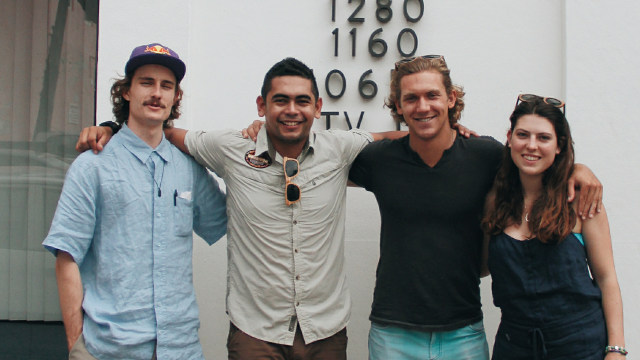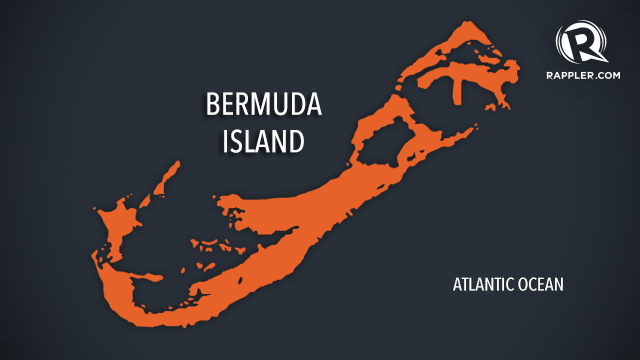SUMMARY
This is AI generated summarization, which may have errors. For context, always refer to the full article.
MANILA, Philippines – A Filipino is part of a 4-man team now in Bermuda combating coastal plastic pollution using nothing but paddleboards, cameras, an adventurous streak and a whole lot of perseverance.
Julian Rodriguez, who has hosted TV adventure show GamePlan and worked behind the scenes for Survivor: Philippines joins the expedition as a photographer and second cameraman.

The expedition, backed by the Jacques Cousteau Society and National Geographic, requires the team to circumnavigate the island of Bermuda for 10 days using only paddleboards.
The team’s mission is to collect scientific data, document the beauty of Bermuda and encourage people all over the world to take a stand against coastal plastic pollution.
Dubbed the Plastic Tides expedition, it was launched on June 8, in celebration of World Oceans Day, to spread awareness about how the dumping of plastics is endangering the health of seas.
A day before the expedition is launched, Rappler asked Rodriguez what it’s like to be on the brink of an adventure that is as crazy as it is purposeful.
Rappler: Why paddleboards?
Julian: We’re using paddleboards for the expedition mainly because it has a minimal carbon footprint and it’s a great way to get anywhere above water. We’ll be using a specially made trawl for Adventurers and Scientists for Conservation. This will be the first time that collecting samples will be in its most untouched form because we won’t have a boat motor that will push particles of plastic away from our sample tubes and also possibly put motor oil in the water.
R: Why Bermuda?
J: Bermuda is located in the Sargasso Sea and essentially is the first to be directly affected by any changes in the Atlantic. So, in contrast to the country’s beautiful water and islands, plastic trash not only from the country but other places bordering the Atlantic is slowly and steadily polluting the water and coast.
Typically in terms of disposing of our trash, we’re in the mentality of “out of sight, out of mind.” If we bring the issue into our sights, then definitely it will be in our minds.

R: What are your specific tasks in the team?
J: I’m the team photographer and second camera for the documentary. I’ll also be helping make sure the team is on schedule for the beach clean-ups and school visits that will be taking place along the 10-day route.
R: How did you get involved with this project?
J: I worked with Gordon, one of the team members on the set of Survivor. One day, about half a year ago, he decided to send me an email and ask me if I wanted in on a tentative project. The idea was spawned from a National Geographic Young Explorer’s workshop and evolved into what it is now. It sounded crazy, but sometimes crazy is what we need to get things done.
R: What made you decide to join?
J: The big picture is what made me join. Coming from the Philippines, our beaches are sadly worse polluted than many of the beaches I’ve seen while traveling. (READ: Boracay: Paradise lost?)
But we can change that. If we can find proper backing, whatever we come up with here in Bermuda, we’re also planning on bringing to the Philippines after this project. (READ: Water pollution a rising threat in Coron)
R: What exactly is coastal plastic pollution?
J: Coastal plastic pollution is exactly what you think: plastic pollution that is near land. These areas are essential to the maintenance of our ocean and, quite frankly, who wants to go to a beach full of litter?
The coast hosts a large variety of marine species and is often the most vulnerable habitats to our society’s throw-away culture.
R: What are possible solutions to coastal plastic pollution?
J: First and foremost, we’ve got to stop treating our planet like a trash dump. We need to be conscious of what we do with our waste and what type of products we are using. Single-use plastic is the worst offender because it is designed to be thrown away and yet as well to be incredibly durable.
The plastic bottle you throw away today, will wash up on the shores of your great-grandchildren’s great-grandchildren. Seriously. Every piece of plastic that has ever been made still exists today. It’s just an absurd thing to think about and clearly it’s far from sustainable. (READ: ‘Not much improvement in Manila Bay water quality’)
This is why the problem needs more than just people making the change. Our team likes to say that it’s a people problem that needs a material solution. While certainly our single-use ways are the cause, there are simply too many people accustomed to its convenience to even hope that spreading the word will be the cure.
In the end, anti-plastic legislation and alternative bio-degradable and sustainable materials are where the solution lies.
R: You’ve been affiliated with many outdoor/adventure shows like Survivor and GamePlan. Do you think being adventurous and into outdoor sports has cultivated a love for nature? In what way?
J: You’re not far off the mark. For me though, it was my love for nature that cultivated my adventurous spirit and my love for outdoor sports. I’ve always felt a strong connection to Mother Earth and being adventurous has let me enjoy that connection to its fullest.
R: What about this expedition are you most excited about?
J: Many things, but most excited about? Well, I’d have to say I’m most excited about its potential. If what we do can influence others and can capture the attention of the world, we hope to keep doing Plastic Tides expeditions in different locations all over. We’ve already got our eyes set on the Philippines and Indonesia.
R: What is your message to Filipinos on caring for the ocean?
J: My message as a Pinoy is just to “take the time.” Take the time to observe how we affect our ocean, take the time to see how much trash is left on the beach and in the water. Take the time to stop and imagine how bad the pollution can get in a few years if we do not do anything. We can’t instantly improve our environment but if we take the time to fix it then all those years of pollution can be reversed. (READ: PH oceans in crisis: The sad state of small fisherfolk)
– Rappler.com
Plastic bag in coral reef image from Shutterstock
Add a comment
How does this make you feel?
There are no comments yet. Add your comment to start the conversation.